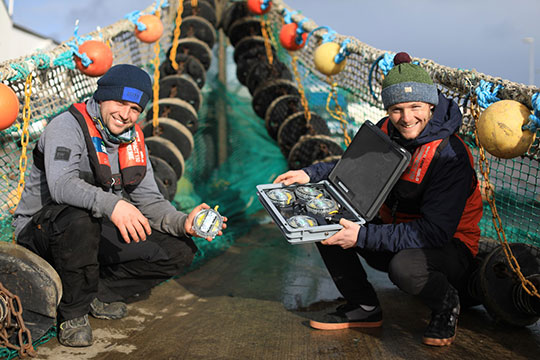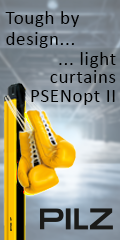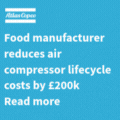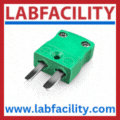
Posted to News on 14th Mar 2022, 11:30
Potting a pressure-resistant device for deep sea fishing

Globally, one in every ten fish caught is ‘bycatch’, caught unintentionally while trying to catch another type of fish. Each year, nine million tonnes of bycatch is caught, wasting time, effort and revenue for fishermen, while causing unnecessary damage to marine biodiversity. SafetyNet Technologies (SNTech) is a London-based start-up working to improve the sustainability of fishing practices by designing and building devices that increase the selectivity of commercial fishing.
The company’s flagship product, Pisces, spun out of its founder’s university project. It is a sophisticated kit of ten LED lights that fits onto fishing gear to enable more precise fishing. The device works by exploiting a natural behavioural response of fish – different colours of light will attract some species of fish, while scaring others away.
Using the device means fisherman catch more of their target species, while reducing bycatch, helping them meet regulations, avoid fines, and fish more sustainably. In essence, the device transforms the trawl net, by making it selective.
SNTech works closely with fisherman, scientists, suppliers, and regulators to create user-centred solutions to the issues the industry faces. One such enquiry came from fishermen in New Zealand, who were interested in using Pisces for deep sea fishing. However, the device was only rated to 20 to 30 bar pressure – a depth of around 250 metres.
To meet the needs of the industry, SNTech’s engineering team sprang into action. In six weeks, the team aimed to develop a new version of the device, Pisces Deep, rated to 100 bar pressure for use at a depth of up 1000 metres. To save time, the team decided to use as much of the original design as possible. One of the only major differences was that, to protect the electronics against higher pressure, SNTech planned to resin cast part of its initial design.
While potting is a standard technique to improve the water and pressure resistance of oceanographic equipment, it was not a technique used in any of SNTech’s previous devices. However, members of the team had used potting compounds in previous roles and knew to reach out to Intertronics for support.
Material selection for a challenging environment
Intertronics was available to listen to SNTech’s main requirements and recommend a solution. Because light colour and intensity are integral to the functioning of the device, one of the most important requirements for the potting compound was that it was optically clear.
In addition, marine environments are one of the toughest industrial environments for a device to function in. Because the potted resin would form part of the outer surface of the device, the material needed to be scratch resistant, UV resistant, capable of withstanding thermal shock, salt water, and more.
Another challenge was changing the design while maintaining its niche features. For example, the battery saving technology in the device works using water sensing, which would need to be maintained even with a new outer device surface.
Darren Rea, internal sales executive at Intertronics said: “When SNTech approached us, we discussed the two main options, polyurethanes or silicones. Based on their requirements we suggested three materials for them to evaluate. SNTech already had their core materials specified, so we advised on material compatibility and explained how the new materials would function in their device.”
Following testing, the material that best met SNTech’s criteria was the optically clear Opti-tec 4210. While some optically clear potting compounds are of soft to medium hardness, Opti-tec 4210 has Shore D80 surface hardness. It also boasts excellent long term UV stability for use outdoors due to the incorporation of UV stabilisers and antioxidants, has high mechanical strength, and its low viscosity makes it easy to mix and process.
Simon Gibbs, technical sales executive at Intertronics said: “Though SNTech had requested only optically clear materials, we had previous experience working with a customer that had used a combination of optically clear and non-optically clear materials to produce their electronic device more cost effectively.
“Drawing on this, we recommended another material, the non-optically clear IRS 3071, for use on the bottom part of the device where there are no LEDs. This black semi-rigid potting compound is specifically designed for the cost-effective encapsulation of electronic applications and reduced the cost per part significantly compared with a pure Opti-tec 4210 solution.”
Based on both the commercial and technical conversations with Intertronics, the team at SNTech chose to incorporate both Opti-tec 4210 and IRS 3071 into its design.
Naomi Gold, senior mechanical engineer at SNTech said: “We worked hand in glove with Intertronics to build a successful process that ensured we could use the materials they had supplied us effectively. At first, we were having problems with bubbles during our potting process, and we were worried about structural weakness.
“We set a technical call with Intertronics, who did a deep dive into our facility and how we were processing the materials to identify the source of the problem. The tips and tricks Simon gave us revolutionised our process, we no longer have any air gaps in the electronics package – we’re really happy with the results.”
Pisces Deep has since passed pressure tests at 100 bar and is now available to order. The SNTech team has done a small batch production in the UK, deployed devices to the West coast of Scotland and the Pacific Northwest coast of America.
Longer term, the SNTech plans to iterate the design to improve the product even more, as well as develop its assembly process to make it simpler and faster. The company has other products in the pipeline, for which it anticipates getting back in touch with Intertronics.
Naomi Gold concluded: “Intertronics was extremely helpful on both the commercial and technical side of the project – their experience was invaluable. The team has been very adaptive and responsive to our sales demands, and it is great to have a partner that is so flexible and understanding.”





